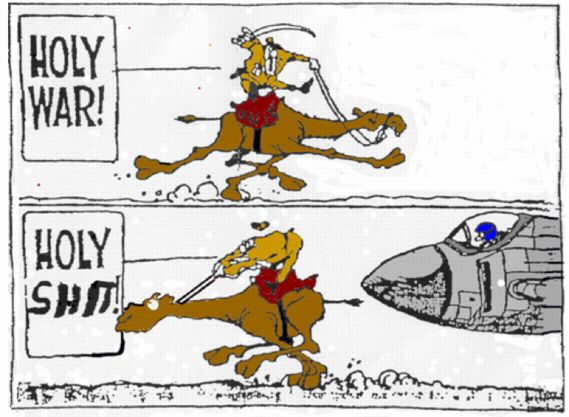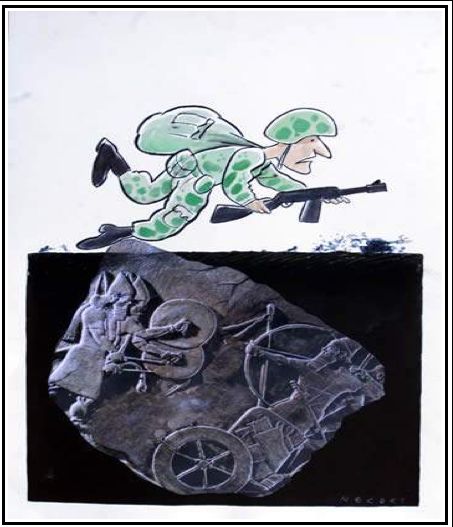Fascinating, insightful interview with Andrew J. Bacevich on Aug 15. He's a well-known and well-respected geoplitical analyst and retired West Point grad / Army Colonel. A few quotes from the interview, his bio, and a link follow.
He analyzes how that simple phrase, "The American way of life is not negotiable" has led us to way we are today, with huge and unending debts, a military we cannot afford that nonetheless polices the globe to ensure the needs and wants of the U.S. come first, and an imperial presidency where power has been concentrating in the Commander-in-Chief for the last 40 years.
He also discusses the impact on the country, its citizens, Congress, and the military, in both the immediate and longer term.
Well worth the read.
"
BILL MOYERS: Here is one of those neon sentences. Quote, "The pursuit of freedom, as defined in an age of consumerism, has induced a condition of dependence on imported goods, on imported oil, and on credit. The chief desire of the American people," you write, "is that nothing should disrupt their access to these goods, that oil, and that credit. The chief aim of the U.S. government is to satisfy that desire, which it does in part of through the distribution of largesse here at home, and in part through the pursuit of imperial ambitions abroad." In other words, you're saying that our foreign policy is the result of a dependence on consumer goods and credit.
ANDREW BACEVICH: Our foreign policy is not something simply concocted by people in Washington D.C. and imposed on us. Our foreign policy is something that is concocted in Washington D.C., but it reflects the perceptions of our political elite about what we want, we the people want. And what we want, by and large - I mean, one could point to many individual exceptions - but, what we want, by and large is, we want this continuing flow of very cheap consumer goods...
BILL MOYERS: You intrigued me when you wrote that "The fundamental problem facing the country will remain stubbornly in place no matter who is elected in November." What's the fundamental problem you say is not going away no matter whether it's McCain or Obama?
ANDREW BACEVICH: What neither of these candidates will be able to, I think, accomplish is to persuade us to look ourselves in the mirror, to see the direction in which we are headed. And from my point of view, it's a direction towards ever greater debt and dependency.
BILL MOYERS: And you write that "What will not go away, is a yawning disparity between what Americans expect, and what they're willing or able to pay." Explore that a little bit.
ANDREW BACEVICH: Well, I think one of the ways we avoid confronting our refusal to balance the books is to rely increasingly on the projection of American military power around the world to try to maintain this dysfunctional system, or set of arrangements that have evolved over the last 30 or 40 years....
BILL MOYERS: And you use this metaphor that is intriguing. American policy makers, quote, "have been engaged in a de facto Ponzi scheme, intended to extend indefinitely, the American line of credit." What's going on that resembles a Ponzi scheme?
ANDREW BACEVICH: This continuing tendency to borrow and to assume that the bills are never going to come due. I testified before a House committee six weeks ago now, on the future of U.S grand strategy. I was struck by the questions coming from members that showed an awareness, a sensitivity, and a deep concern, about some of the issues that I tried to raise in the book...
"How are we gonna pay the bills? How are we gonna pay for the commitment of entitlements that is going to increase year by year for the next couple of decades, especially as baby boomers retire?" Nobody has answers to those questions. So, I was pleased that these members of Congress understood the problem. I was absolutely taken aback when they said, "Professor, what can we do about this?" And their candid admission that they didn't have any answers, that they were perplexed, that this problem of learning to live within our means seemed to have no politically plausible solution...
BILL MOYERS: The disturbing thing that you say again and again in here, is that every President since Reagan has relied on military power to conceal or manage these problems that stem from the nation's habits of profligacy, right?
ANDREW BACEVICH: That's exactly right...
ANDREW BACEVICH: I am expressing in the book, in a sense, what many of us sense, even if many of us don't really want to confront the implications. The Congress, especially with regard to matters related to national security policy, has thrust power and authority to the executive branch. We have created an imperial presidency. The congress no longer is able to articulate a vision of what is the common good. The Congress exists primarily to ensure the reelection of members of Congress.
As the imperial presidency has accrued power, surrounding the imperial presidency has come to be this group of institutions called the National Security State. The CIA, the Joint Chiefs of Staff, the Office of the Secretary of Defense, the other intelligence agencies. Now, these have grown since the end of World War Two into this mammoth enterprise.
But the National Security State doesn't work. The National Security State was not able to identify the 9/11 conspiracy. Was not able to deflect the attackers on 9/11. The National Security State was not able to plan intelligently for the Iraq War. Even if you think that the Iraq War was necessary. They were not able to put together an intelligent workable plan for that war.
The National Security State has not been able to provide the resources necessary to fight this so called global war on terror. So, as the Congress has moved to the margins, as the President has moved to the center of our politics, the presidency itself has come to be, I think, less effective. The system is broken."
http://www.pbs.org/moyers/journal/08...anscript1.html
Bio:
"The limits of American power have never been more vividly on display. That's the subject of my conversation this week with Andrew J. Bacevich. Here is a public thinker who has been able to find an audience across the political spectrum, from THE NATION or THE AMERICAN CONSERVATIVE magazines...
After 23 years in the Army, the West Point graduate retired as a colonel and has been teaching international relations and history at Boston University. Bacevich has published several acclaimed books, including this one, THE NEW AMERICAN MILITARISM. His latest, published this week, is THE LIMITS OF POWER: THE END OF AMERICAN EXCEPTIONALISM."
He analyzes how that simple phrase, "The American way of life is not negotiable" has led us to way we are today, with huge and unending debts, a military we cannot afford that nonetheless polices the globe to ensure the needs and wants of the U.S. come first, and an imperial presidency where power has been concentrating in the Commander-in-Chief for the last 40 years.
He also discusses the impact on the country, its citizens, Congress, and the military, in both the immediate and longer term.
Well worth the read.
"
BILL MOYERS: Here is one of those neon sentences. Quote, "The pursuit of freedom, as defined in an age of consumerism, has induced a condition of dependence on imported goods, on imported oil, and on credit. The chief desire of the American people," you write, "is that nothing should disrupt their access to these goods, that oil, and that credit. The chief aim of the U.S. government is to satisfy that desire, which it does in part of through the distribution of largesse here at home, and in part through the pursuit of imperial ambitions abroad." In other words, you're saying that our foreign policy is the result of a dependence on consumer goods and credit.
ANDREW BACEVICH: Our foreign policy is not something simply concocted by people in Washington D.C. and imposed on us. Our foreign policy is something that is concocted in Washington D.C., but it reflects the perceptions of our political elite about what we want, we the people want. And what we want, by and large - I mean, one could point to many individual exceptions - but, what we want, by and large is, we want this continuing flow of very cheap consumer goods...
BILL MOYERS: You intrigued me when you wrote that "The fundamental problem facing the country will remain stubbornly in place no matter who is elected in November." What's the fundamental problem you say is not going away no matter whether it's McCain or Obama?
ANDREW BACEVICH: What neither of these candidates will be able to, I think, accomplish is to persuade us to look ourselves in the mirror, to see the direction in which we are headed. And from my point of view, it's a direction towards ever greater debt and dependency.
BILL MOYERS: And you write that "What will not go away, is a yawning disparity between what Americans expect, and what they're willing or able to pay." Explore that a little bit.
ANDREW BACEVICH: Well, I think one of the ways we avoid confronting our refusal to balance the books is to rely increasingly on the projection of American military power around the world to try to maintain this dysfunctional system, or set of arrangements that have evolved over the last 30 or 40 years....
BILL MOYERS: And you use this metaphor that is intriguing. American policy makers, quote, "have been engaged in a de facto Ponzi scheme, intended to extend indefinitely, the American line of credit." What's going on that resembles a Ponzi scheme?
ANDREW BACEVICH: This continuing tendency to borrow and to assume that the bills are never going to come due. I testified before a House committee six weeks ago now, on the future of U.S grand strategy. I was struck by the questions coming from members that showed an awareness, a sensitivity, and a deep concern, about some of the issues that I tried to raise in the book...
"How are we gonna pay the bills? How are we gonna pay for the commitment of entitlements that is going to increase year by year for the next couple of decades, especially as baby boomers retire?" Nobody has answers to those questions. So, I was pleased that these members of Congress understood the problem. I was absolutely taken aback when they said, "Professor, what can we do about this?" And their candid admission that they didn't have any answers, that they were perplexed, that this problem of learning to live within our means seemed to have no politically plausible solution...
BILL MOYERS: The disturbing thing that you say again and again in here, is that every President since Reagan has relied on military power to conceal or manage these problems that stem from the nation's habits of profligacy, right?
ANDREW BACEVICH: That's exactly right...
ANDREW BACEVICH: I am expressing in the book, in a sense, what many of us sense, even if many of us don't really want to confront the implications. The Congress, especially with regard to matters related to national security policy, has thrust power and authority to the executive branch. We have created an imperial presidency. The congress no longer is able to articulate a vision of what is the common good. The Congress exists primarily to ensure the reelection of members of Congress.
As the imperial presidency has accrued power, surrounding the imperial presidency has come to be this group of institutions called the National Security State. The CIA, the Joint Chiefs of Staff, the Office of the Secretary of Defense, the other intelligence agencies. Now, these have grown since the end of World War Two into this mammoth enterprise.
But the National Security State doesn't work. The National Security State was not able to identify the 9/11 conspiracy. Was not able to deflect the attackers on 9/11. The National Security State was not able to plan intelligently for the Iraq War. Even if you think that the Iraq War was necessary. They were not able to put together an intelligent workable plan for that war.
The National Security State has not been able to provide the resources necessary to fight this so called global war on terror. So, as the Congress has moved to the margins, as the President has moved to the center of our politics, the presidency itself has come to be, I think, less effective. The system is broken."
http://www.pbs.org/moyers/journal/08...anscript1.html
Bio:
"The limits of American power have never been more vividly on display. That's the subject of my conversation this week with Andrew J. Bacevich. Here is a public thinker who has been able to find an audience across the political spectrum, from THE NATION or THE AMERICAN CONSERVATIVE magazines...
After 23 years in the Army, the West Point graduate retired as a colonel and has been teaching international relations and history at Boston University. Bacevich has published several acclaimed books, including this one, THE NEW AMERICAN MILITARISM. His latest, published this week, is THE LIMITS OF POWER: THE END OF AMERICAN EXCEPTIONALISM."



Comment